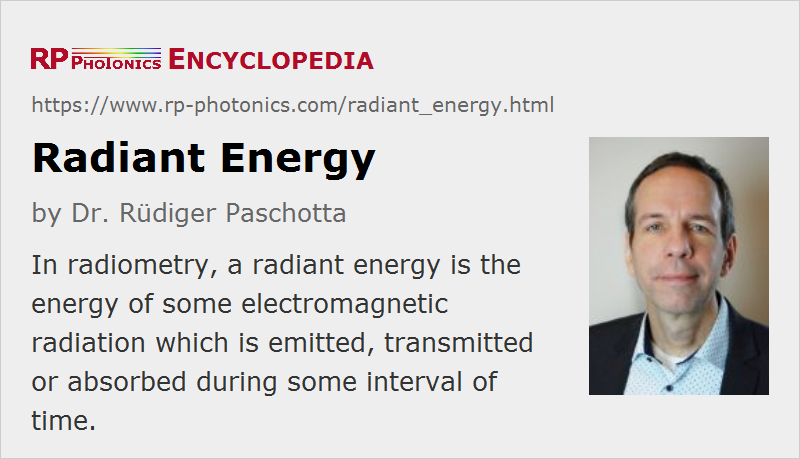Radiant Energy
Definition: energy of some electromagnetic radiation which is emitted, transmitted or absorbed during some interval of time
Alternative term: optical energy
German: Strahlungsenergie
Categories:  general optics,
general optics,  light detection and characterization,
light detection and characterization,  optical metrology
optical metrology
Units: J
Formula symbol: <$Q_\textrm{e}$>
Author: Dr. Rüdiger Paschotta
Cite the article using its DOI: https://doi.org/10.61835/w3r
Get citation code: Endnote (RIS) BibTex plain textHTML
In radiometry, a radiant energy is the energy of some electromagnetic radiation which is emitted, transmitted or absorbed during some interval of time. The corresponding photometric quantity is the luminous energy <$Q_\textrm{v}$>. A final value of the radiant energy is obtained for light pulses, or for a considered limited time interval for continuous radiation.
The term radiant energy is common in fields like illumination and radiative heating (with infrared radiation), but less so in laser technology, where it is more common to use the term pulse energy for the energy in an optical pulse.
Many radiometric quantities are derived from the radiant energy. For example, the radiant flux is the radiant energy per unit time, which in optics corresponds to the optical power. A radiant exposure is the received radiant energy per unit area.
More to Learn
Encyclopedia articles:
Questions and Comments from Users
Here you can submit questions and comments. As far as they get accepted by the author, they will appear above this paragraph together with the author’s answer. The author will decide on acceptance based on certain criteria. Essentially, the issue must be of sufficiently broad interest.
Please do not enter personal data here; we would otherwise delete it soon. (See also our privacy declaration.) If you wish to receive personal feedback or consultancy from the author, please contact him, e.g. via e-mail.
By submitting the information, you give your consent to the potential publication of your inputs on our website according to our rules. (If you later retract your consent, we will delete those inputs.) As your inputs are first reviewed by the author, they may be published with some delay.





2024-01-10
Is radiant energy the same as photon energy? If radiant energy is the energy of electromagnetic radiation and the electromagnetic waves have photon energy, this seems to tell me that they are equivalent.
The author's answer:
Although radiant energy can be considered to be transported by photons, with the photon energy one usually means the energy of a single photon, rather than the energy e.g. of a light pulse.